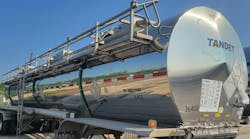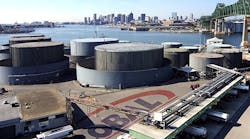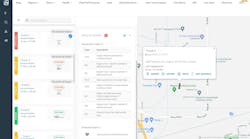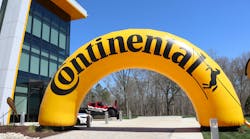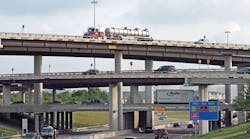HOUSTON—and the entire Gulf Coast region of Texas—could be the Gateway of America, but it won’t happen unless a transportation infrastructure is built.
That’s the assessment of Harris County (Texas) Judge Edward M Emmett, a former president and chief executive officer of the National Industrial Transportation League and a former member of the Interstate Commerce Commission. He discussed the logistics outlook October 17 during the annual International Bulk Liquid Symposium in Kemah, Texas.
“Global trade is going to increase,” he said. “Ships are going to get bigger. They’re going to come, make one port of call, and go back. I contend that China is not the future. China is now. I think of future places like India, Brazil, and even Africa. And that traffic will come across the Atlantic. If you wanted to pick one place to serve North America, where would you come? It’d be right here (Houston). We’re perfectly positioned, if we do the right things and take the right steps.
“Because environmentalists are really going to hamper the way the two main coal-export facilities on the West Coast do business, China and the Panama Canal suddenly did become somewhat important. Because if you’re going to export coal and you can’t do it through the West Coast, where are you going to do it? Right here. So Kinder Morgan and others are building huge coal-export facilities and those ships will go out of Houston, transit the Panama Canal, and go to Asia.”
Emmett said the third channel of the Panama Canal is now wide enough to handle LNG tankers. Prior to this, 87% of these ships couldn’t go through the Panama Canal.
“That wasn’t a big deal before because imports of LNG were going to come from the Middle East through the Suez Canal,” he said. “It didn’t matter to us. Suddenly, the same four import sites switched and re-permitted as export facilities so LNG exports now are really going to use the Panama Canal in a big, big way. That’s going to be a big trade benefit for us, being able to be an LNG exporter.
“I am promoting—every chance I get—the use of both compressed and liquefied natural gas, particularly in the port area. I talked to one port commissioner recently about establishing a CNG fueling station for the drayage trucks, and a big incentive would be if you’re CNG-fueled, you get to go to the front of the line. For drayage drivers, that’s money. The more trips they can make, the more money they make. It’s already been tested in court, because taxi cabs at DFW Airport have the same system.
“Why is it important otherwise? Well, we’re a non-attainment area. So if there’s a clean fuel, it’s CNG. We all know drayage trucks are not always the most sterling examples of the trucking industry, so if we can get more of them to be non-polluting, that’s better for everyone involved.”
He said the Gulf Coast has to start looking at other things beyond the Panama Canal.
“While there is hope of dredging the Port of Houston to 50 feet, the truth is that Freeport probably has a much better chance because it’s a six-mile dredge versus 40 miles,” he said. “But what’s the problem with Freeport? They’ve only got one railroad, and big ships are not going to want to serve a port that’s captive to one rail. So that must be addressed.
“The rail yard inside Loop 610 (in Houston) was put there back in the early ‘30s for one purpose—to get it completely out of the City of Houston. But now it’s pretty much dead in the center. There’s no talk of moving it, but how do you route traffic, particularly hazardous traffic, more efficiently? One answer is the West Belt (highway), which is on the east side of town. It’s got probably 40 or 50 grade crossings. We are trying to form a public-private partnership through the Gulf Coast Rail District to eliminate those crossings because that will make traffic flow easier.”
On the highway side of the transportation issue, US 59—which runs all the way through Texas from the Mexican border in Laredo into Arkansas—will be converted into the Interstate 69 corridor, but a bypass is needed in Houston. Emmett said everybody assumed it’d go to the west, but it will actually go to the east.
“That way, they can serve the ports of Shreveport (Louisiana), Galveston, Texas City, and Houston, and those trucks don’t have to go back into town, which is incredible,” he said. “But we have a problem: no money. The Texas legislature, like other legislatures, and Congress have suddenly decided, ‘Well, we don’t necessarily want to fund the infrastructure.’
“There’s a real fight on. The Tea Party crowd doesn’t want to spend any money, and they don’t want to raise any fees or taxes. We allowed for years the argument to be between free roads and toll roads. There never was such a thing as a free road. It was always paid for by a gasoline tax. Well, with the gasoline tax in Texas, they finally passed a bill that will be given to the voters as a proposition next fall that will address it a little. But if the gasoline tax were not to be raised in Texas or there was no new fee, under the current revenue stream TxDOT would only have enough money to maintain the current lanes they have and not build a single new lane anywhere in the state of Texas in the next two years. That cannot continue.
“Those of you in the industry need to make sure everybody understands that. We have a lot of people in politics in Texas who like to talk about the Texas Economic Miracle, but that miracle is going to go away if we don’t build an infrastructure that allows your business to continue, and everybody else in the freight business.”
Emmett said people don’t talk enough about the intracoastal waterway.
“More of you should move product by barge,” he said. “It’s such an efficient way of doing it. When the Eagle Ford Shale play development began, there were no pipelines in the region. Now Victoria, which is 30 miles inland from the coast, is a barge canal port. Every day on the farm market road, the trucks are lined up, coming in one at a time, unloading into tanks, and the Port of Victoria has developed two liquid terminals already. Every truck that transfers cargo in the Port of Victoria is one less on the highway into Houston. Sooner or later, pipelines are going to get built.
“But long term, I’m convinced we need to find more ways to do water-to-water transfer. It’s done elsewhere in the world. We don’t do nearly enough here. It’s pretty easy, if we’re talking about liquids, to set up a system. With containers, it’s a bit dicier.
“We need to focus as an industry and as a government at all levels on all modes of transportation. MAP-21 paid some lip service to freight. There has been a national Freight Advisory Committee formed, and to my knowledge, they have yet to meet.
“We all know that saying we’ve all heard for years: Freight doesn’t vote. That’s true. You can get people excited about commuters. But how do you get people excited about moving freight? You have to start talking about it as pocketbook issue. I remind people all the time: No matter what you think about trucks, in today’s world everything you buy is delivered by a truck. My message is, there are those of us in local government who want to help, but somehow we need to band together. Washington DC has more trade associations than you can imagine.
“We’re all subject to new and changing technologies. Things that we think are permanent aren’t permanent unless we take action. What’s the largest container port in the UK? Felixstowe. It didn’t even exist 25 years ago. It was this little bitty place on the coast. You had Liverpool, London, and Southhampton. Why did Felixstowe become the biggest container port? Because you could move boxes in and out easier. You didn’t have that urban congestion.
“The same will apply to our area if we don’t do what’s right. I’ll give you an example: Mexico may eventually get their act together. What if Mexico decided, ‘We’re going to go in the middle of nowhere and build a container port the world has never seen, and we’re going to serve North America from there because those guys in Texas don’t have their act together?’ That would be a shame.” ♦
